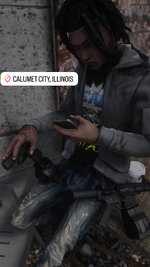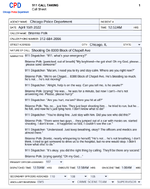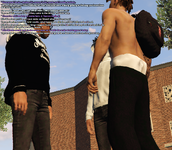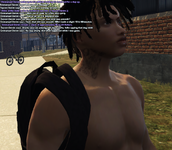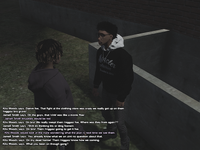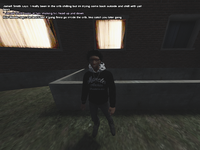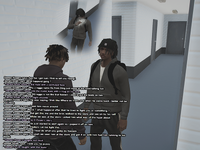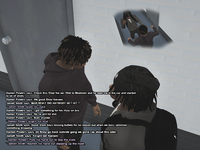
Dating back to 2019, the Southside Chicago set known as FreeNoBrains (FNB) was established by a group of young African American teenagers living in Parkway Gardens, an area better known as "OBlock." Born out of the struggles and tensions within this community, FNB was founded by Fredo, a 20-year-old visionary who grew up amidst the challenges of Southside life. Drawing from both Renegade Black Disciples and Conservative Vice Lords, Fredo and his friends formed this faction with a clear aim: to secure their own territory and protect their community, even if it meant breaking from traditional gang alliances. FNB’s membership stands out in Chicago’s gang landscape, with members ranging in age from as young as 13 to 21, forming a younger demographic than most local sets. Their territory covers part of the Woodlawn area, specifically from the E 6200 Block of S King Drive to the E 6500 Block of S Marquette.
This stretch of blocks forms the heart of FNB’s control, with a network of alleys, housing complexes, and storefronts that they use as their operational base. Despite their youth, the members of FNB are resourceful and street-savvy, with a deep loyalty to their territory and each other. The foundation of FNB is rooted in Fredo’s personal experiences. Raised in a tumultuous environment, Fredo witnessed many peers become victims of violence, poverty, and loss, which motivated him to create a different path for himself and his friends. Disillusioned with the strict codes of more established gangs, Fredo sought to create a new faction that would prioritize mutual respect and protection for one another over rigid hierarchies. The group’s name, *FreeNoBrains*, is a darkly ironic reflection of their lifestyle, a reminder of the risks they face daily in a world that often seems to offer them few choices. More than anything, FNB values loyalty, independence, and resilience. The group operates on a tight-knit sense of community; they see themselves as family and are deeply invested in each other’s well-being, often helping one another financially or providing shelter for those who may need it. This closeness is essential to surviving the dangers of Southside life and defending their neighborhood. FNB members have developed a collective identity that’s rooted in both pride for their community and defiance of outside authority, whether that be other gangs or law enforcement.
While FNB’s primary mission is self-preservation and community defense, they have also become involved in several criminal activities to support their operations and maintain their turf. These activities include small-scale drug trafficking, protecting neighborhood businesses, and running occasional underground events that serve to both gather funds and reinforce their presence. They are known for being shrewd and agile in their methods, often disguising their activities as legitimate events, such as block parties or local gatherings. One of FNB’s most defining characteristics is their quick retaliation in disputes, which has led to rivalries with other gangs in nearby territories. These tensions occasionally erupt in violent confrontations, although FNB tries to limit these occurrences to avoid drawing law enforcement scrutiny. However, when provoked, they are known for their “no-nonsense” approach, making it clear that any threat to their group or territory will be met with firm resistance. In addition to gang-related activities, FNB is active within the Woodlawn community. They host informal events and provide support to families in need, viewing these actions as necessary to earn respect and goodwill from their neighbors. Despite their activities, which often place them at odds with the law, many local residents view FNB as both a source of protection and a part of the community’s fabric. Though FNB is relatively new and young, they have established a formidable presence, shaping the culture and dynamic of their territory with a blend of defiance, loyalty, and survival, creating a name for themselves that resonates beyond the borders of their blocks.
This stretch of blocks forms the heart of FNB’s control, with a network of alleys, housing complexes, and storefronts that they use as their operational base. Despite their youth, the members of FNB are resourceful and street-savvy, with a deep loyalty to their territory and each other. The foundation of FNB is rooted in Fredo’s personal experiences. Raised in a tumultuous environment, Fredo witnessed many peers become victims of violence, poverty, and loss, which motivated him to create a different path for himself and his friends. Disillusioned with the strict codes of more established gangs, Fredo sought to create a new faction that would prioritize mutual respect and protection for one another over rigid hierarchies. The group’s name, *FreeNoBrains*, is a darkly ironic reflection of their lifestyle, a reminder of the risks they face daily in a world that often seems to offer them few choices. More than anything, FNB values loyalty, independence, and resilience. The group operates on a tight-knit sense of community; they see themselves as family and are deeply invested in each other’s well-being, often helping one another financially or providing shelter for those who may need it. This closeness is essential to surviving the dangers of Southside life and defending their neighborhood. FNB members have developed a collective identity that’s rooted in both pride for their community and defiance of outside authority, whether that be other gangs or law enforcement.
While FNB’s primary mission is self-preservation and community defense, they have also become involved in several criminal activities to support their operations and maintain their turf. These activities include small-scale drug trafficking, protecting neighborhood businesses, and running occasional underground events that serve to both gather funds and reinforce their presence. They are known for being shrewd and agile in their methods, often disguising their activities as legitimate events, such as block parties or local gatherings. One of FNB’s most defining characteristics is their quick retaliation in disputes, which has led to rivalries with other gangs in nearby territories. These tensions occasionally erupt in violent confrontations, although FNB tries to limit these occurrences to avoid drawing law enforcement scrutiny. However, when provoked, they are known for their “no-nonsense” approach, making it clear that any threat to their group or territory will be met with firm resistance. In addition to gang-related activities, FNB is active within the Woodlawn community. They host informal events and provide support to families in need, viewing these actions as necessary to earn respect and goodwill from their neighbors. Despite their activities, which often place them at odds with the law, many local residents view FNB as both a source of protection and a part of the community’s fabric. Though FNB is relatively new and young, they have established a formidable presence, shaping the culture and dynamic of their territory with a blend of defiance, loyalty, and survival, creating a name for themselves that resonates beyond the borders of their blocks.
"ON KING DAVID"
Parkway Gardens, now known for factions like FreeNoBrains (FNB) and often referred to asWIIIC City, is a central part of Chicago's Southside, holding a history marked by challenges, resilience, and loyalty. Originally constructed in the 1950s as an affordable housing project, Parkway Gardens was intended to provide Black families with a safe and stable community amidst the economic and racial barriers of the time. Initially, it was seen as a positive development, a place where families could build better lives. However, economic decline, underfunding, and a lack of resources gradually reshaped the area, eventually transforming it into a hotspot for gang activity and violence that is far from its original vision.
By the 2000s, Parkway Gardens had become known for a strong gang presence, shaped largely by The Black Disciples (BDs), one of Chicago’s most influential street organizations. The Black Disciples originated in the late 1960s during a period of social and economic upheaval on Chicago’s Southside. Formed from a split within the larger Disciple Nation, which included groups like The Conservative Vice Lords (CVLs) and The Original Gangster Disciples, the Black Disciples took on a more structured approach to gain power and control in the neighborhoods where they were active. With a focus on loyalty and a firm belief in their principles, the BDs quickly developed into a powerful organization with significant influence in various Chicago neighborhoods, including Parkway Gardens.
These two groups, both formed out of the socio-economic challenges that swept through Chicago’s Southside, have been shaped by decades of rivalry. The rivalry has left a deep mark on communities like Parkway Gardens, as these groups continuously compete for territory, respect, and influence. In 2019, FreeNoBrains (FNB) emerged within Parkway Gardens, a newer set primarily composed of younger BDs along with a few members from the Conservative Vice Lords. FNB staked their claim on parts of the Woodlawn area, from the E 6300 Block of S King Drive to the E 6600 Block of S Marquette. Unlike older sets, their members are known for taunting rivals online, engaging in public displays of dominance, and openly challenging anyone who questions their authority in the area.
"ON THE DRIVE WHERE IT'S ALL GOOD"
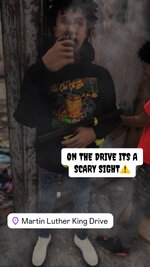
FreeNoBrains extends from East 61st to 66th Streets, bordered by Calumet and Marquette Road. This area is home to various subsets that control different territories, with GLG or Green Light Gang being one of the most notorious. Primarily composed of African American teenage boys, GLG operates mainly from 64th and King Drive, where they have gained a reputation for involvement in criminal activities that draw the attention of both local residents and law enforcement. Green Light Gang’s prominence is underscored by its size and reach, making it one of the largest subsets in the area. With a diverse membership that includes many youths ranging from ages 14 up to 19, GLG has managed to maintain control over a substantial portion of FNB. This large membership base provides the gang with a notable advantage, enabling them to assert dominance over rival factions and engage in various criminal enterprises. Their presence has created a sense of unity among members, who often view the gang as a family. This bond fosters loyalty, encouraging members to engage in illegal activities to protect and advance their collective interests, thereby solidifying GLG's status as a significant force within the local gang culture.
The founder of GLG, Brixton Caldwell—known as GLG Budda—has significantly impacted the gang's presence. At just 21 years old, Brixton, an Insane Gangster Disciple, helped establish the group in the apartments where these young men would gather, fostering strong bonds and a shared sense of purpose. His leadership has been instrumental in shaping GLG’s identity.
On April 15, 2022, Brixton faced serious legal trouble when he was arrested for attempted murder after a violent confrontation with a rival gang member. Convicted and sentenced to 23 years in prison, this event marked a critical turning point for both him and the gang. While he has been implicated in several violent crimes across the city, the Chicago Police Department has found it challenging to gather enough evidence to charge him with more offenses, often hindered by the gang's code of silence and community reluctance to cooperate. Brixton’s younger brother, Braeden Caldwell, is now thrust into a leadership role at just 19 years old, who is also an Insane Gangster Disciple. The area has seen a surge in criminal activities, including carjackings, shoplifting, and gun violence. In response, as law enforcement increases its focus on the area, the Chicago Police Department has implemented gang task forces specifically targeting groups like Green Light Gang. Officers patrol the neighborhood more frequently, aiming to disrupt the gang's operations. However, this heightened presence often leads to tension between the police and community members, who are wary of law enforcement's intentions.
"WE DONT STARVE"
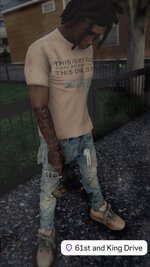 TakersTown is a young and ruthless subset of the Black Disciples, mostly made up of African American teenage boys who claim the blocks around 61st and 62nd on King Drive as their territory. This crew has built a reputation for fearlessness and confidence, especially when it comes to disrespecting their rivals, known as "opps." On social media, TakersTown is notorious for their taunting posts, videos, and live streams, where they mock their enemies and flaunt their latest “takes.” For TakersTown, stealing isn’t part of their vocabulary; they don’t “steal”—they “take without asking.” This attitude of entitlement has become a major part of their identity, setting them apart from other gangs.
TakersTown is a young and ruthless subset of the Black Disciples, mostly made up of African American teenage boys who claim the blocks around 61st and 62nd on King Drive as their territory. This crew has built a reputation for fearlessness and confidence, especially when it comes to disrespecting their rivals, known as "opps." On social media, TakersTown is notorious for their taunting posts, videos, and live streams, where they mock their enemies and flaunt their latest “takes.” For TakersTown, stealing isn’t part of their vocabulary; they don’t “steal”—they “take without asking.” This attitude of entitlement has become a major part of their identity, setting them apart from other gangs. TakersTown targets anything with value that will boost their reputation or power on the streets. They’re best known for taking expensive jewelry, guns, and cars, which they call “strikers.” When it comes to strikers, they often steal high-end or fast cars that allow them to make quick getaways or showcase their skills. These “trophies” serve as symbols of their success and dominance, and they don’t hesitate to post videos of themselves wearing the jewelry or cruising in their latest ride on social media. This constant display of their gains not only gives them bragging rights but also serves as a warning to their rivals that TakersTown isn’t afraid to come and “take” whatever they want, whenever they feel like it.
The TakersTown crew is highly social media savvy, using platforms like Instagram and Facebook to amplify their image. They’ll often live-stream moments just after taking valuables, even showing off the specific items they’ve seized. These videos and photos serve as both a form of intimidation and self-promotion, sending a message to their rivals and peers alike. By doing this, they gain respect and fear from people around them, as they prove they’re not only capable of taking high-value items but are also bold enough to show it to the world without fear of consequences. Their flashy attitude and willingness to publicly mock their enemies set them apart and make them one of the most talked-about crews in their area.
TakersTown’s younger members are especially eager to make a name for themselves, pushing each other to be bolder and gain more “trophies.” For them, these valuables aren’t just items; they’re status symbols that prove their strength, ambition, and success within the gang. The crew believes that taking from others is a way to earn respect and power on the streets, making sure that everyone around knows they don’t ask—they take.
On Calumet, a street often referred to as the backstreet, lies the territory of a subset known as Rico Way. This group is composed primarily of African American teenage boys and young men who hail from the Calumet Buildings, an area marked by both its rich history and the challenges that come with urban life. The name "Rico Way" serves as both a tribute and a rallying cry for their fallen member, Raheem "Rico" Carter, whose life was tragically cut short. Rico Way specifically occupies the E 6300 Block of South Calumet, where it intersects with Marquette Avenue. This particular stretch of road has witnessed the struggles, dreams, and camaraderie of its residents. It has served as both a sanctuary and a battleground, reflecting the quality of life in this neighborhood.
The members of this group are slightly older than those in some other local factions, with many ranging in age from 17+. This age difference provides them with a unique perspective on the challenges they face, as they are often caught between the carefree exuberance of youth and the harsh realities of adulthood. Established in 2013 by Raheem Carter and his close friend Henry "Ace" Dotson, Rico Way originally went by the name Calumet Boyz, or CMB. Their inception came during a time of escalating tensions and competition among various street gangs in Chicago.
They quickly carved out their niche in the area, earning respect among their peers and forming bonds that would last through both good times and bad. The group’s founding was rooted in a desire for community, protection, and a sense of belonging—qualities that many of the boys lacked in their lives, given the instability that often characterized their environment. Rico Way thrived in the early years, establishing a reputation for loyalty and brotherhood. They became known for their gatherings, often organizing cookouts and block parties that fostered a sense of unity among neighborhood residents. However, the turning point for Rico Way came in the winter of 2017, when tragedy struck. Raheem Carter was fatally gunned down in an act of violence that shook the community to its core.
The day of his funeral was marked by sorrow; friends and family gathered to pay their respects, sharing stories and memories of the young man whose life had been extinguished far too soon. In the wake of Rico’s death, the group felt a profound sense of loss. To honor his memory and preserve his legacy, they rebranded themselves as Rico Way, embracing their fallen comrade’s name as a reminder of the bonds that brought them together. Since then, Rico Way has become a well-known presence in the area.
"The Death of Rico"
— Chicago, IL — On August 10, 2017, Raheem "Rico" Carter, a 25-year-old member of the Conservative Vice Lords, was shot and killed in a violent incident that has left the South Side community reeling. Rico was known as a co-founder of the CMB set, which has a significant presence in the neighborhood. Friends describe him as a key figure among his peers, respected for his leadership and connections within the community. The events leading to his death unfolded when he was reportedly at the apartment of a woman named Tasha, with whom he had shared a long-standing friendship. Tasha’s affiliation with a rival neighborhood raised eyebrows, but Rico and Tasha maintained a relationship that predated the gang tensions that often divide the communities. Sources indicate that the two spent the evening together, enjoying each other's company, when Tasha suddenly informed Rico that he needed to leave around 11 p.m. She stated that she had to assist her mother, who was reportedly unwell. The abruptness of the request left some wondering about the timing and circumstances, but Rico complied, gathering his belongings as he prepared to exit. As Rico opened the door to leave, he was confronted by three masked men who emerged from a vehicle parked nearby. Witnesses report that the men rushed toward him, causing Rico to instinctively attempt to retreat back inside the apartment. However, the door had locked behind him, leaving him with no way to escape. Realizing the danger, he made a split-second decision to run in the opposite direction. Gunshots rang out, and Rico was struck multiple times, suffering serious injuries to his upper body. The chaos unfolded rapidly, with neighbors describing the sound of gunfire echoing through the streets. Emergency services were called to the scene, and paramedics arrived quickly to provide assistance. Rico was transported to St. Fiacre's Hospital, but despite the efforts of medical staff, he was pronounced dead at 1:45 a.m.
The aftermath of Rico's death has sparked outrage and grief within the community. Friends, family, and associates gathered to mourn the loss of a man many viewed as a prominent figure in their lives. In his memory, they rebranded to what is now known as Rico Way, aiming to honor his legacy and continue his influence within the neighborhood. The new group seeks to promote camaraderie and solidarity among its members while addressing the challenges of gang life in the area. Local residents and community leaders have expressed deep concern about the ongoing violence and gang activity in the South Side. Many have called for increased community support and intervention programs to tackle the underlying issues contributing to such tragedies. Activists stress the importance of finding constructive solutions to prevent future violence and foster safer environments for the youth. Authorities are actively investigating the shooting, seeking information regarding the suspects involved. Community members have been urged to come forward with any information that could assist law enforcement in bringing those responsible to justice. The incident serves as a stark reminder of the dangers that persist in neighborhoods grappling with gang-related violence, and it highlights the urgent need for collective action to create lasting change.

"INSIDE CHICAGO'S MOST TERRIFYING STREET GANG: Brains On 64th"
" THAT GETBACK GOT NO DATE! "

Brixton Caldwell, known on the South Side of Chicago as "GLG Budda," was implicated in the attack. Budda, who was on the police radar for links to multiple murders across the city, had been at a neighborhood block party earlier that evening. During the gathering, he received a tip from someone in the neighborhood about Corey location—a rival associated with past conflicts involving Budda’s gang.
Fueled by adrenaline, Budda quickly rallied three fellow gang members and, after arming themselves, they set out in a four-door sedan. The crew navigated the dimly lit streets until they spotted Corey. Budda gave the signal, and the group opened fire on him as he and Brianna walked. The relentless barrage of gunfire sent shockwaves through the quiet neighborhood. Realizing the gravity of their actions, Budda and his crew attempted a getaway, speeding off as sirens blared in the distance. In their haste, the group lost control and crashed the car nearby. Budda managed to flee on foot, ditching his 9mm pistol in a nearby wooded area where he was later caught and is awaiting trial currently.

Last edited by a moderator:

